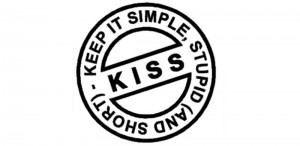Business Presentation and Image
Introduction

You only have one chance to make a first impression.
An investor received a knock on his office door and in walked a woman dressed from head to toe as an avocado.
She reached in her bag and handed him a thick business plan about guess what?
Avocados!
The investor shook his head in a “No Way!” gesture, and as he let the woman out, said to her, “Regardless of whether I was interested in what you had to say, I’m not about to do a deal with anyone dressed like an avocado and a plan as thick as a phone book.”
Outrageous as this anecdote may seem, such stories abound in the world of investment and business. Many entrepreneurs fail to realize that a critical factor in startup success is your image and presentation.
And fewer still understand the need for SIMPLICITY.
The Good News?
Creating a professional business presentation and image need not be expensive or complex.
The (potentially) Bad News?
Creating a simple, clear business presentation and image can be very challenging.
Consider the following facts:
- “90% of most impressions are made in the first 30 seconds of contact, and they are not based on the substance of the communication”
- I repeat: “90% of most impressions are made in the first 30 seconds of a meeting and they are not based on the substance of the communication”
- Most people will only spend 2-4 minutes on your website, and the top three places on most Google searches account for 80-90% of the clicks
- Our lives and careers are over-saturated with digital, video, audio, and print content. About the only communication media that are declining are the US mail, catalogues, and newspapers.
The challenges of presenting the right image and making impactful business presentations are crucial to resolve if you want your business to rise above the “chatter.”
If you think I am on to something, read on.
General Considerations
It’s Not About Content
In early business presentations, we frequently become preoccupied with the format and content and we neglect the most important consideration — our Goal and Purpose.
Are we selling something, developing a relationship, impressing the audience, or something else? What is the “take-away,” the “call-to-action” that is actually desired from the audience?
- To buy your product?
- To sign a contract?
- To invest?
For many entrepreneurs, it seems that the “Goal” is:
- To bore the audience
- To put them to sleep, and
- To insure that there won’t be a next meeting.
How to Manage Inevitable Distractions
Let’s say you are presenting to a group and there is someone in the audience who is creating a distraction, or getting you off track with irrelevant questions. You need to remember that it’s YOUR job to manage the business presentation and not allow such distractions to derail you.
The Curse of “Content” — Why “KISS” is the Key
 A few weeks ago, a client and I were discussing how to improve a business presentation because he thought the material was over some of the participants’ head. He insisted on including as much content as possible. He failed to realize that too much information can lead to failure.
A few weeks ago, a client and I were discussing how to improve a business presentation because he thought the material was over some of the participants’ head. He insisted on including as much content as possible. He failed to realize that too much information can lead to failure.
The simple rule: “KISS” applies to almost every business presentation.
One expert uses this rule:
“Create your presentation, then cut it in half… then cut it in half again!”
How Well Do You Really Know Your Audience?
A sure way to avoid the mistake of over-complicating your business presentation is to make sure you understand your audience and their key interests.
Before you develop your business presentation, ask the following questions:
- What is the most important problem my product or service can solve for them?
- How is my product or service superior to others they may be considering?
- How much time do they have for my business presentation?
- Are my business presentation materials engaging and clear?
If you don’t know the answers to these and related questions, don’t be afraid to ask. Use their answers to help decide which benefits to play up in your message, and make it as informative as possible.
Your Image–Remember the Avocado Woman
Another key element of presenting has to do with the image you project to your audience. No matter what the “Avocado Woman” had in her business plan, she failed to create a positive and credible image to her audience.
Here’s where researching your audience and their culture comes in. If you are presenting to a “formal” business culture you may want to wear a suit and tie. A less formal company culture might mean “business casual”. The key is for your audience to feel comfortable.
Business Presentation Goes Beyond the Meeting
Another factor influencing effective presentations has to do with the type, level and timing of follow up. Emails, calls, reminders, etc. are often necessary to improve the chances that the desired call-to-action actually happens. Make sure that you understand your audience’s needs for such follow up, and tailor the type, level, and frequency accordingly.
Don’t Rely on Digital Communications Only
These days we can tend to focus too much on the communication content and not the process of the communication.
Quite simply, we are not always aware of the need for more one-on-one communication, and at times for even informal exchange with our audience as the process evolves.
Such a personal touch will often distinguish you and your company from others. It can also help build understanding and trust, which are often missing from the mass of impersonal emails, auto-responders, spam, pop-up presentations, reports and other “canned” forms of content that dominate much of our lives these days.
Emphasize the Positive—Give them a Glass That’s Half Full
There is no substitute for making your business presentation a “WIN-WIN” with an emphasis upon solutions, problem-solving, and the benefits of doing business with your company.
A win-win environment helps develop support, consensus and shared goals.
Keep your presentation positive, up-beat, and don’t speak poorly of either your competition or your audience’s competitors.
Be sure to respect your audience’s expertise, experience and opinions — this will help insure that you are taken seriously and that you are perceived as being open to new ideas.
Specific Considerations
- Make sure your information is relevant to your audience’s needs and interests.
- Don’t confuse your business presentation with superfluous information. The only thing your audience cares about is whether or not your company can meet their needs.
- Make sure all of your business presentation materials are consistent and professional.
- Give your name, your company name and try to learn the names and roles of those in your audience. Put a signature on your emails with name, website, e-mail address, and phone number.
- Anticipate Technical Issues. Frequently, events are scheduled in tight time slots to justify the expense of taking people away from work. Details such as the date, time, room, equipment, and temperature control can make a big difference.
- Don’t sabotage yourself. Many of the errors I have hi-lighted in this article can be illustrated in a “bad PowerPoint presentation.” There is nothing worse for an audience than having the lights go out and being subjected to a long, irrelevant PowerPoint presentation. If this is your plan, you could save both you and your audience time and effort by cancelling the meeting in advance.
- Take away the risk. Once you’ve built up the desire to have what you sell, you could still lose. Repeat the confidence in the product, yourself, and the company. If possible offer guarantees, samples and assistance with any problems.
- Incorporate informality humor and stories into your presentation. Vary tone, detail and emotion to create interest and avoid boredom.
- Practice appropriate business etiquette. Verbal presentation success is really a function of do’s and don’ts. The most important of these is proper behavior, dress, and courtesy. Learn to say “How are you?” “Please,” and “Thank you.” Look at people when you are speaking with them. Do not interrupt conversations to answer your phones or check text messages.
- Use visual aids, gestures, emotion, and movement to enhance your presentation. Use headlines and graphics your audience cares about
- Close with a Call to Action. Tell your audience what you want them to do after seeing your business presentation. Don’t just assume your audience will look for your phone number or email address and contact you. If you don’t tell them what action to take, they may take the wrong one, including possibly calling another merchant or service provider instead of you.
- Make it easy for your audience to respond. Be sure your name, your business name, your website, email address, and phone number are easily found. I can’t believe how many websites, e-mails, and presentations omit key contact information.
In Summary…
In today’s business environment, we are inundated with unprecedented levels of input in a myriad of formats. LESS IS MORE.
Your audience will first focus on how to filter OUT information—not how to take it in.
Your challenge is to engage your audience so they will want to take your information IN.
I was going to write another 16 paragraphs about this subject, but instead… I decided to “KISS IT”!